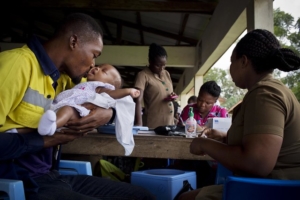Drones Bringing Vaccinations to Ghana

Over the past few decades, Ghana has been able to drastically improve its vaccination rates through education and communication with communities. Right now, vaccination rates for diphtheria, tetanus and whooping cough are at 98 percent in Ghana, compared to 94 percent in the U.S. The child mortality rate in Ghana has dropped by 30 percent and is now at 5 percent.
Additionally, measles, which used to be one of the predominant causes of child mortality in Ghana, has now been nearly eradicated. This is due in part to the double-roll out in 2012, which was the first time any African country introduced two vaccines at the same time, the pneumococcal and rotavirus vaccines. It proved to be wildly successful, reinforcing Ghana as a model for neighboring countries.
Despite these improvements, one of the main roadblocks to increasing the coverage and effectiveness of vaccines in Ghana is accessibility. One promising solution to this roadblock is drones bringing vaccinations to Ghana.
Drones Bringing Vaccinations to Ghana
Planning to reach the remaining unvaccinated Ghanaians, the Ghanaian government recently launched the start of its partnership with Zipline, a company utilizing drones to deliver medical supplies to underserved regions. The technology increases the accessibility of essential medical supplies without having to wait for the costly infrastructure development of better roads and train access. Zipline is currently able to provide 13 million people vital medicine incredibly quickly. At the four distribution centers located throughout Ghana, doctors can place an order via text for any necessary medications and reliably expect a delivery within 30 minutes.
In addition, one of the primary challenges in increasing vaccination coverage is access to electricity for refrigeration. Zipline’s quick and reliable delivery system solves this issue as supplies are received still cold. This innovative battery powered medical delivery system is able to deliver goods pilotless, thus reducing emissions costs and medicine transport costs. This makes it an incredibly cost-effective mode of transport, aiding initiatives to offer free vaccinations to children in Ghana.
With dozens of hospitals relying on Zipline for emergency medicinal deliveries, access to life-saving medical supplies has already increased dramatically in hard to reach areas. In Rwanda, where Zipline has served for the past 3 years, maternal mortality rates are dropping drastically due to emergency drone deliveries of rare blood types.
Just a few decades ago, Ghanaians were in a statistically alarming situation. The introduction of Zipline is bringing medical supplies to Ghanaians who still lack access. With plans to eventually provide access to vital medical supplies all around the world, Zipline appears to be revolutionizing the world of medicinal accessibility for the world’s underdeveloped regions. As Zipline is a relatively new company, it’s too soon to have data determining long term impacts. However, given the rapid changes Zipline has brought to Ghana and Rwanda’s medical access already, it’s feasible to imagine a future where drones bringing vaccinations is commonplace.
– Amy Dickens
Photo: Flickr
